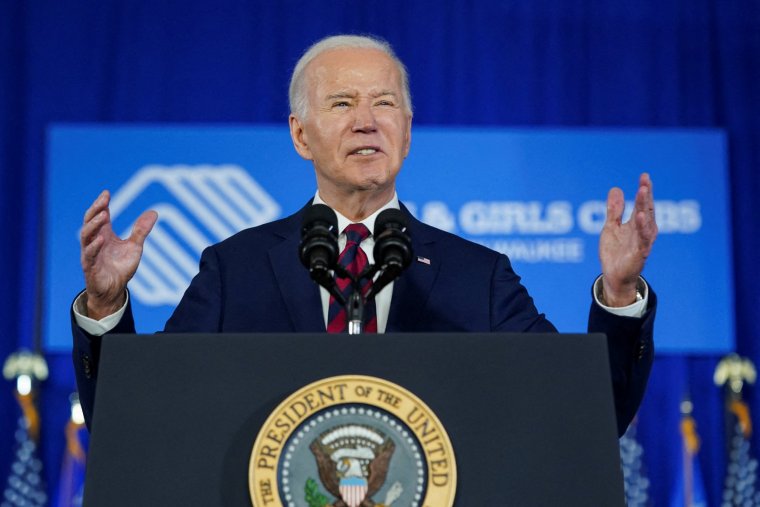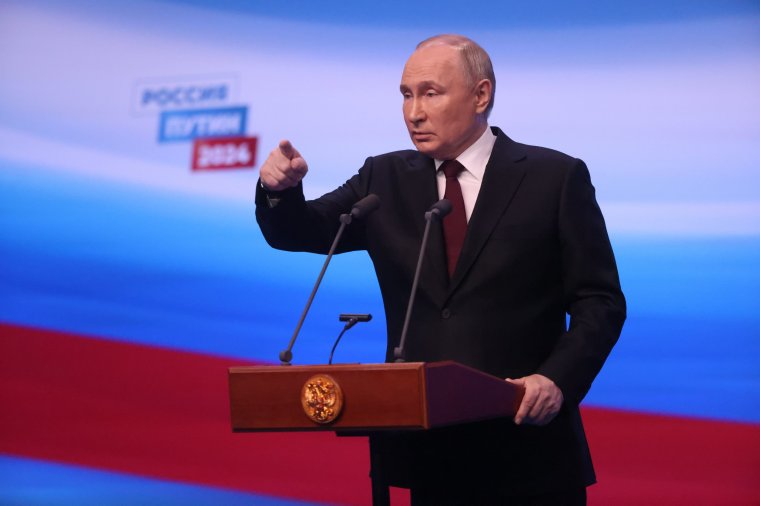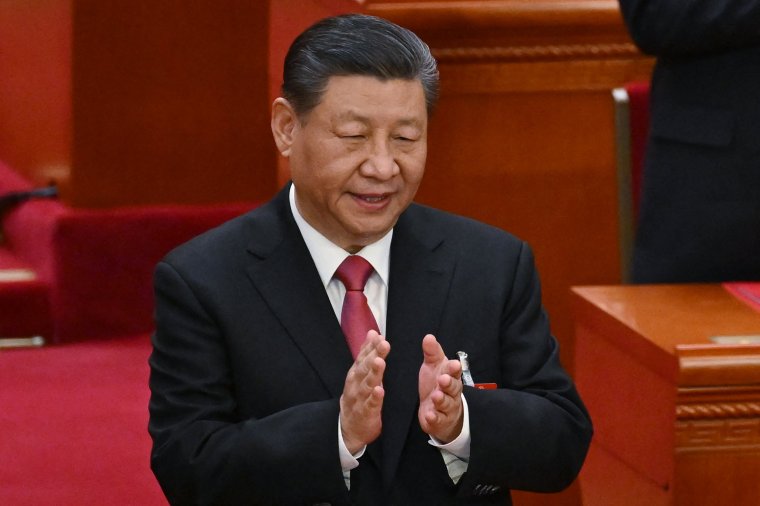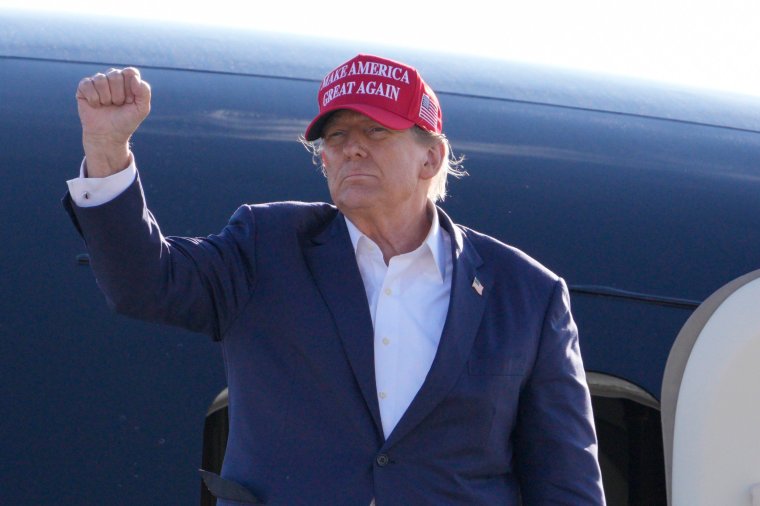Are we living in a new gerontocracy? You might be forgiven for thinking so. A glance across the international landscape reveals a striking surfeit of ageing (male) leaders.
In this year’s United States presidential election, voters will witness a rematch between the same two elderly men we endured in 2020. It will be America’s oldest presidential battle in history, with octogenarian Joe Biden, 81, facing off against septuagenarian Donald Trump, 77.
And it’s not just in the US where the baby boomers are holding tight to the reins of power. Major economies including China and India are ruled by Xi Jinping, 70, and Narendra Modi, 73, respectively.
Global players with enormous influence include Russia’s Vladimir Putin, 71 – who has just sealed his hold on the presidency for another six years and is waging a war in Europe that has created cracks in Western unity – and Israel’s Benjamin Netanyahu, 74, embroiled in a devastating conflict in the Middle East.
Who will turn the tide? Mahmoud Abbas of the Palestinian Authority is 88 and Egypt’s Abdel Fattah al-Sisi is 69. The world’s oldest national leader, Paul Biya, the President of Cameroon, is 91 years old.
President Joe Biden, 81
The oldest US president in history, Mr Biden will be 86 by the end of his second term in office if he is re-elected in November.
A series of embarrassing gaffes has exacerbated concern that he does not have the mental capacity to perform the duties of the president. He has variously confused the wars in Ukraine, Iraq and Gaza, mixed up the presidents of Mexico and Egypt, and discussed speaking to the former German chancellor Helmut Kohl in 2020 – even though he died in 2017.
Days earlier, he seemed to confuse François Mitterrand, the former president of France who died in 1996, with the nation’s current leader, Emmanuel Macron.

Particularly damaging was a report released last month into Mr Biden’s handling of classified documents. While the report from Robert Hur, a Republican and former Trump appointee, brought no charges, he described the Democratic President as “a sympathetic, well-meaning, elderly man with a poor memory”.
Labelled “senile” by the Trump campaign, Mr Biden insisted: “My memory is fine.”
His lawyers said: “We disagree with a number of inaccurate and inappropriate comments in the special counsel’s report.”
However, the Trump campaign has sought to capitalise on the issue, and opinions polls show that many Americans are concerned he is too old for the job.
In an NBC poll last month, 62 per cent of voters, including half of Democrats, said they had major concerns that Mr Biden did not have the mental and physical health to be president again. Ninety-five per cent of Republican voters said they had major or moderate concerns.
Vladimir Putin, 71
Geriatric hegemony is not limited to the US. In Russia, Mr Putin, in power of some form for more than 20 years, has just been re-elected by a landslide in sham elections.
As president of Russia since 2000, apart from a brief stint as prime minister because of a two-term limit imposed by the Russian constitution (which he subsequently ditched), Mr Putin has clamped down on any opposition to his rule. Conceivably, he could run for another term in 2030, when he is 78.
He has already surpassed the average life expectancy for a Russian man, of 68.2 years. However, unconfirmed claims of illnesses including cancer and Parkinson’s disease have followed him for years, with the Kremlin forced to deny rumours in 2022 that he was ill or dying.

In elections this weekend that offered no viable alternative candidates, and came only weeks after the probably state-ordered murder of his best-known opponent, the Kremlin critic and opposition politician Alexei Navalny, Mr Putin won a fifth term by a landslide. Ella Pamfilova, head of Russia’s Central Election Commission, declared on Monday that he had secured 87 per cent of the ballots, or 76 million votes.
The West has, near unanimously, condemned the vote as a farce and “pseudo-election”. Lord Cameron, the Foreign Secretary, said: “Putin removes his political opponents, controls the media, and then crowns himself the winner. This is not democracy.” He noted “widespread reports of electoral violations”, with any potential opponents who spoke against the war in Ukraine “swiftly disqualified”.
Ukraine’s President Volodymyr Zelensky declared that Mr Putin was “drunk with power and is doing everything to rule forever”.
The Golos movement, an independent group that monitors elections in Russia, dismissed the outcome of the election, saying: “Never before have we seen a presidential campaign which was so in breach of constitutional standards.”
Xi Jinping, 70
Like Mr Putin, Mr Xi of China has spent the past few years extending and consolidating his iron grip on the country. President Xi has set himself up to become the country’s longest-serving head of state, with near-total control over the Chinese Communist Party.
In 2023, he began an unprecedented third term as president of the party after China’s rubber-stamp parliament waved it through. Mr Xi was awarded another five years as general-secretary in October 2022.

His predecessors Jiang Zemin and Hu Jintao gave up power after 10 years in office, as part of efforts by the party to ensure a regular change of leadership and prevent a return to dictatorship.
However, Mr Xi abolished term limits in 2018 and has since concentrated power in his own hands to a level not seen since Mao Zedong.
Who will be our next ageing leader?
The day after this year’s 2024 US presidential election, either Mr Biden or Mr Trump will — barring a health crisis — be ruling the country.
Like his rival, Mr Trump has made his fair share of embarrassing mistakes on the campaign trail. He has repeatedly confused the incumbent with former president Barack Obama, telling crowds earlier this month: “Putin has so little respect for Obama that he’s starting to throw around the nuclear word. You heard that. Nuclear. He’s starting to talk nuclear weapons today.”

He appeared to mix up former South Carolina governor Nikki Haley, his erstwhile rival for the Republican nomination, with the former Democratic House speaker Nancy Pelosi, telling supporters: “Nikki Haley was in charge of security” during the Capitol riots on 6 January, 2021.
Before she ducked out of the race for the GOP nomination, Ms Haley used the slip-ups to criticise the former president, stating: “He’s not what he was in 2016. He has declined.” She labelled Mr Trump and Mr Biden “grumpy old men” and “stumbling seniors”, and called for “mandatory mental competency test for politicians over 75 years old”.
“These are people making decisions on our national security. These are people making decisions on the future of our economy. We need to know they’re at the top of their game,” she added.
However, the NBC News poll last month found that only 34 per cent of voters had major concerns about Mr Trump having the necessary mental and physical health for a second presidential term.
What does this tell us?
Increasingly old men are in charge in countries worldwide. Turkey’s Recep Tayyip Erdogan is 70; Ali Khamenei of Iran is 84; Norway’s King Harald is 87 and was recently fitted with a pacemaker.
Mr Biya of Cameroon was born in 1933 and he took office more than 40 years ago in 1982. Elections in Cameroon have been dogged by claims of rampant fraud.
According to research, countries that are less free tend to have older leaders. The Washington-based Pew Research Centre found in 2023 that in countries classified as not free, the median age of the leader is 69, compared with 61 in countries classified as partly free, and 58 in countries classified as free.
“The United States is one of only two countries that are classified as free and have a leader in their eighties or older. The other is Namibia, where the president is 81-year-old Hage Geingob,” it said.
Younger leaders leading freer countries can be seen in examples such as the United Kingdom, where Rishi Sunak is 43, Canada where Justin Trudeau is 52, and France, where Mr Macron is 46.
Among reasons suggested for the high number of older leaders are the fact that lifespans are increasing, the older generation controls the majority of wealth, or even that amid a backlash to globalisation, voters are turning to more traditional or conservative policies embodied by older politicians.


